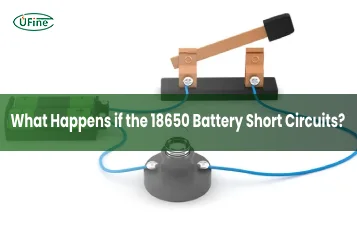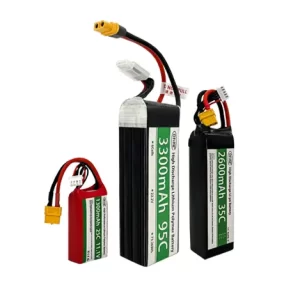What is a drone battery? This question serves as a gateway to understanding the crucial role of LiPo batteries in powering drones efficiently. This article delves into the intricacies of selecting the ideal LiPo battery for your drone, exploring key factors, and addressing common queries to aid in informed decision-making.
Part 1. What is a drone battery?
A drone battery, also called a LiPo (Lithium Polymer) battery, is the power source that gives energy to a drone. It’s like the fuel tank for a car, but instead of gas, it uses electricity. These batteries are small and light, essential for drones because they must fly without being too heavy.
Drone batteries are made of unique materials that can hold a lot of energy in a small space. They have different parts that power the drone’s motors and electronics. LiPo batteries are popular because they give much power quickly, making drones fly fast and do tricks in the air. However, being careful with drone batteries is essential because they can be dangerous if improperly handled.
Part 2. Ufine’s drone batteries for sale
Renowned for their exceptional performance and reliability, Ufine’s LiPo drone batteries stand out in the market. These batteries are tailored to meet the demands of drone enthusiasts and professionals alike. With a focus on optimizing flight time, power output, and safety, Ufine offers a range of top-rated LiPo batteries ideal for powering your drone adventures. Let’s explore some of these high-quality options.
Part 3. Factors to consider when choosing a LiPo battery
When choosing a LiPo battery for your drone, there are several important factors to consider to ensure optimal performance and safety:
Capacity
This refers to the energy the battery can store, usually measured in milliampere-hours (mAh). Higher capacity batteries can provide longer flight times but may also be heavier.
Voltage
LiPo batteries come in different voltages, such as 3.7V, 7.4V, and 11.1V. The voltage you choose should match the requirements of your drone’s motors and electronics. Using the wrong voltage can damage your drone or cause it to malfunction.
Discharge Rate
The discharge rate indicates how quickly the battery can release its stored energy. It’s usually denoted by a “C” rating, such as 25C or 50C. Higher discharge rates are better for drones that require high power output, such as racing drones or those with heavy payloads.
Size and Weight
Consider the physical dimensions and weight of the battery to ensure it fits appropriately in your drone’s battery compartment and doesn’t add too much weight, affecting its flight performance.
Connector Type
- XT60 Connector: Widely used in drones, robust design, handles high currents.
- XT30 Connector: Smaller than XT60, suitable for smaller drones, balances size and performance.
- Deans Connector (T-Plug): Popular among hobbyists, secure connection, low resistance.
- JST Connector: Common in toy drones, small and simple, suitable for low-power applications.
- EC3/EC5 Connector: Developed by E-flite, it has a high-current rating and a secure locking mechanism.
- Bullet Connector: Simple soldered connector, used in DIY drone projects, offers flexibility in wire gauge.
Part 4. How to Choose a Drone Battery?
Battery Chemistry
Lithium polymer (LiPo) batteries are the most common choice when considering the battery chemistry for drones due to their high energy density and lightweight properties. However, it’s crucial to understand the safety implications associated with LiPo batteries. LiPo batteries can be volatile if mishandled and prone to swelling, overheating, or even catching fire. Therefore, handling them carefully and adhering to safety guidelines when charging, storing, and using them is essential.
Built-in Safety Features
Prioritize ones with built-in safety features to mitigate potential risks. Look for batteries equipped with overcharge protection, which prevents the battery from charging beyond safe voltage levels, and thermal sensors, which monitor temperature to prevent overheating. These safety mechanisms ensure your drone’s safe operation and prolong the battery’s lifespan.
Brand Reputation
Opt for brands with a proven track record in the industry, known for adhering to stringent manufacturing standards and producing high-quality batteries. Reading user reviews and feedback can provide valuable insights into the performance and reliability of different brands, helping you make an informed decision.
Cycle Life and Warranty
Consider the battery’s cycle life, which refers to the number of charge-discharge cycles it can endure before its capacity significantly diminishes. Select batteries with a high cycle life rating to ensure longevity and optimal performance. Additionally, pay attention to the warranty terms offered by the manufacturer. Choose batteries with favorable warranty terms to provide assurance and protection against potential defects or malfunctions.
Part 5. FAQs
-
How do I know what battery to get for my drone?
To determine the best battery for your drone:
Consider factors such as voltage, capacity, and size.
Check your drone’s specifications or manual for recommended battery requirements.
Research battery options that match your drone’s power needs and physical constraints.
-
Which battery is best for making a drone?
The best battery for making a drone depends on various factors, including the drone’s size, weight, and power requirements. LiPo (Lithium Polymer) batteries are commonly used for their high energy density and lightweight properties, making them suitable for most drone applications. -
How do you calculate the battery for a drone?
To calculate the battery for a drone:
Determine the power consumption of the drone’s components, including motors, flight controller, and accessories.
Select a battery with sufficient voltage and capacity to meet the drone’s power demands.
Consider factors such as flight time requirements and payload weight when choosing the battery.
-
Which is better, LiPo or Li-ion battery, for a drone?
LiPo batteries are typically preferred for drones due to their higher energy density and ability to deliver high discharge rates, making them suitable for powering drone motors efficiently. Li-ion (Lithium-ion) batteries may offer longer cycle life but are generally heavier and less capable of providing high current outputs than LiPo batteries. -
Why do drones run out of battery so fast?
Drones consume battery power quickly due to factors such as motor operation, flight maneuvers, and payload weight. The high power demands of drone motors, especially during takeoff and flight, contribute to rapid battery depletion. Wind resistance and aggressive flying styles can further reduce flight time. Regular maintenance and optimizing flight conditions can help extend battery life.
Related Tags:
More Articles

18650 Battery Short Circuit: Risks and Safety Tips
Discover what happens during a 18650 battery short circuit, warning signs, and how to avoid fire, damage, and hazardous failures in your devices.
LiPo Battery Discharge Rate Guide & Calculation Tips
Understand LiPo battery discharge rates, C-ratings, and how to calculate max current. Essential guide for RC, drones, and electronics users.
High‑Capacity 3S LiPo Batteries: 5000 mAh vs. 10000 mAh
Compare 3S LiPo 5000mAh vs 10000mAh batteries by weight, power, and use. Find the best fit for your drone, RC car, or boat setup.
Top 5 Applications for Small 3S LiPo Batteries
Small 3S LiPo batteries power drones, RC gear, wearables, and robotics with high energy and low weight. Making them ideal for compact electronics projects.
Building and Charging Your Own 3S LiPo Pack: A Step‑by‑Step Guide
Learn how to build, balance, and charge a 3S LiPo battery pack safely at home with this complete DIY guide for hobbyists and beginners.




